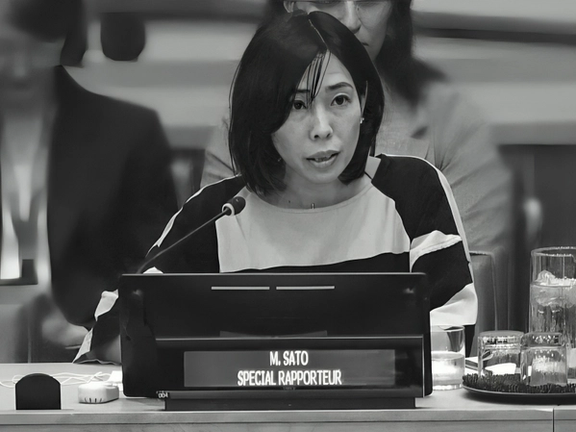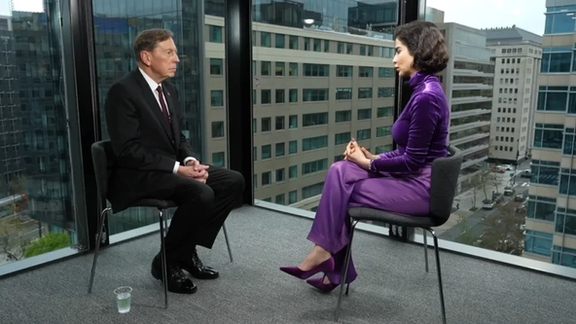Related Articles

The planned amputation of three men’s fingers in Iran amounts to torture and must be halted immediately, the UN Special Rapporteur on Human Rights in Iran told Iran International in an interview.
"Today, I’m very concerned about the possibility of amputation of fingers that may be implemented to three men who have been convicted of theft,” said Mai Sato.
"Corporal punishment, including amputation, is absolutely prohibited under international law. And if executed, will amount to torture or ill-treatment," she said.
Earlier, rights group Amnesty International said the three men — Hadi Rostami, Mehdi Sharfian, and Mehdi Shahivand — held in Urumieh Central Prison in northwestern Iran, were informed by prosecution authorities last month that their sentences would be implemented as early as 11 April.
Amnesty said the same prison carried out amputations on two brothers last October using a guillotine device, raising alarm that authorities are prepared to enforce further amputation sentences.
Despite violating Article 7 of the International Covenant on Civil and Political Rights (ICCPR), to which Iran is a party, Amnesty said the court had sentenced the three men to “have four fingers on their right hands completely cut off so only the palm of their hands and thumbs are left”.
Sato urged the Iranian authorities to halt the amputation sentence on the men.
Amnesty said the three men have consistently maintained their innocence and said that their confessions were forced under torture, including beatings, flogging and suspension by their limbs.
At least 223 amputations have been carried out by Iranian authorities out of 384 known sentences since 1979, according to the US-based rights group the Abdorrahman Boroumand Center.
"The German Foreign Office remains deeply concerned about Iran’s nuclear program," German diplomatic sources told Iran International.
Iran’s recent nuclear escalation has made a diplomatic resolution “all the more urgent – especially in view of the expiry of UN Security Council Resolution 2231 in October,” according to the sources.
“In recent months, Iran has continued to escalate, including by massively expanding its enrichment capacities,” the sources said, adding that the E3 (Germany, France, and the UK) have held multiple rounds of talks with Tehran to press international concerns.
The sources also said Berlin “welcomes the fact that there are now also communication channels between the US and Iran.”

Israeli Prime Minister Benjamin Netanyahu will seek to persuade the Trump administration during a visit to Washington to push for the complete dismantling of Iran’s uranium enrichment program, diplomatic sources in the Middle East told Iran International.
Israel believes that if the Islamic Republic is allowed to retain even a small part of its nuclear program, the sources added, it could rapidly resume enrichment once Trump’s presidency ends or anytime it deems conditions favorable.
The diplomats told Iran International that Israel assesses that Tehran’s sole aim in pursuing talks with the United States is to preserve its enrichment program.
The Israeli prime minister is meeting the US president at the White House, with Iran's nuclear issue among the key focuses of their negotiations, according to Netanyahu's office.
Netanyahu will not advise American officials against engaging in negotiations with Iran, the diplomats told Iran International, but he will urge them to make any talks conditional on the enrichment program's total end.
Earlier in the day, Axios reported that Netanyahu believes the chances of a nuclear deal between Tehran and Washington are extremely low but will present to Trump today how "a good deal should look like".
"Netanyahu wants the Libya model. Full dismantling of Iran's nuclear program", the report said, citing an Israeli official referring to a 2003 decision by Libya's leader Muammar Qadaffi to surrender weapons of mass destruction.
The veteran autocrat was deposed and killed in a Western-backed uprising in 2011.
Iran's Foreign Minister Abbas Araghchi said on Sunday that Washington can only dream of an agreement with Iran similar to the 2003 deal with Libya.
His comments came after Republican Senator Tom Cotton said the deal President Trump wants with Iran would be one that neutralizes Tehran's threat completely.
"He prefers a deal like Libya cut with the United States in 2003," Cotton said in an interview posted on X.
Israeli Prime Minister Benjamin Netanyahu will seek during his visit to Washington to persuade the Trump administration to push for the complete dismantling of Iran’s uranium enrichment program, diplomatic sources in the Middle East told Iran International.
Israel believes that if the Islamic Republic is allowed to retain even a small part of its nuclear program, the sources added, it could rapidly resume enrichment once Trump’s presidency ends or anytime it deems conditions favorable.
The diplomats told Iran International that Israel assesses that Tehran’s sole aim in pursuing talks with the United States is to preserve its enrichment program.
Netanyahu will not advise American officials against engaging in negotiations with Iran, the diplomats added, but he will urge them to make any talks conditional on the enrichment program's total end.
Any potential US airstrike would target not only Iran's nuclear facilities but also its air defense and missile capabilities in a bid to prevent possible retaliation, the former commander of US Central Command told Iran International.
In an exclusive interview with Iran International, former CENTCOM commander and CIA chief David Petraeus said Donald Trump would not stop at a limited attack on Iran's nuclear sites and would go after the Islamic Republic's air defense and missile capabilities.
"You probably have to take out some of the retaliatory capacity of Iran as well because you don't want to just take out the nuclear program and then have them go after the bases where we have forces, and that would then bring in all these other countries, of course," he said.
"This is not just a surgical attack on discrete nuclear capabilities. This is against the retaliatory capabilities, against the defense capability, and that's what has to be done if you're going to carry out this operation."

